Belfast trouble: Police attacked for second night
- Published
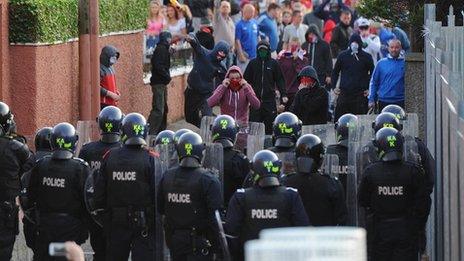
The police have come under attack in north Belfast for a second night
The police have been attacked with petrol bombs in north Belfast as trouble flared for the second consecutive night.
Stones, bottles and fireworks have also been thrown at officers in the Woodvale area. Water cannon have been deployed.
It follows serious rioting on Friday night when 32 police officers and an MP were injured.
Chris Buckler reports from the scene of Saturday's clashes
Another 400 police officers have been brought into Northern Ireland to assist the Police Service of Northern Ireland.
BBC Northern Ireland reporter Mark Simpson said on Saturday: "Hundreds of police officers are trying to stop the violence spreading.
"So far, they are succeeding but the trouble does not seem likely to stop any time soon."
Our correspondent said a police officer was hit by a petrol bomb during the rioting. The officer's colleagues quickly extinguished the flames.
The BBC's Andy Martin, in Belfast, said the rioting was "nowhere near as bad" as on Friday night.
Meanwhile, Castlereagh Street in east Belfast has now re-opened to traffic after crowds had gathered earlier.
Chief Constable Matt Baggott has described the 12 July trouble as "shameful and disgraceful".
Chief Constable Matt Baggott on the riots in Belfast on 12th July: "Those scenes were both shameful and disgraceful."
Clashes developed when police enforced a ban on an Orange Order march.
The order called for widespread demonstrations after marchers were banned from a stretch of road separating loyalists and nationalists. It later said it was suspending its protest.
Twenty-two people have been arrested across Northern Ireland.
Mr Baggott said the Twelfth had been a "day of celebration" for many people and that the majority of parades had passed off "peacefully".
'Emotive'
"But I think this morning (Saturday) some of the leadership within the Orange Order needs to reflect upon whether they provided the responsible leadership asked for by myself and by the party leaders," he said.
"Some of their language was emotive, having called thousands of people to protest, they had no plan and no control, and rather than being responsible, I think the word for that is reckless."
Aerial footage of rioting taken by NI police
Secretary of State Theresa Villiers said she "utterly condemned" the rioting.
She said it was "right" that the Orange Order had suspended its protests and called for the organisation to "call them off completely".
"It is the clear responsibility of everyone who has influence, including the Orange Order, community leaders and politicians, to do what they can to calm the situation. We need temperate language over coming days," she added.
Unionists have defended the Orange Order.
Ulster Unionist councillor Mark Cosgrove who is also a member of the Belfast Parades Forum said it was "irresponsible of the chief constable to blame the Orange Order for the disturbances".
"There were hundreds of thousands of people from both the loyal orders and the bands, the supporters out in Belfast and all over Northern Ireland yesterday and, I think, to try and apportion blame to the Orange Order is totally wrong," he said.
However, Sinn Fein's Martin McGuinness said: "In my opinion, the leadership of the Orange Order failed the Orange Order and they failed these communities."
He added: "The decision announced some hours ago, that they are suspending their protests, was a massive admission by themselves that they were culpable for what happened here last night."
Clashes developed when police enforced a ban on an Orange Order march
Many families with children were caught up in the violence in the north of the city.
Petrol bombs, bricks and fireworks were thrown at the police who responded with water cannon and fired 20 plastic baton rounds.
North Belfast MP Nigel Dodds was knocked unconscious after being hit by a missile thrown by loyalists.
The trouble started when the police blocked a road to enforce a determination made by the Parades Commission, preventing Orangemen from passing Ardoyne on the return route of their annual 12 July march.
The area has seen republican rioting in recent years when the parade was allowed to pass.
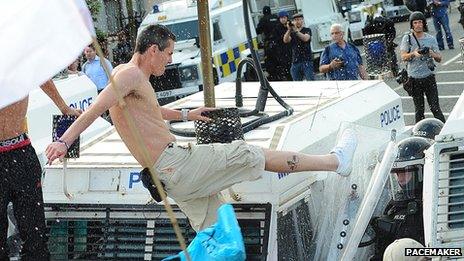
Water cannon and baton rounds were used in north Belfast after violence broke out
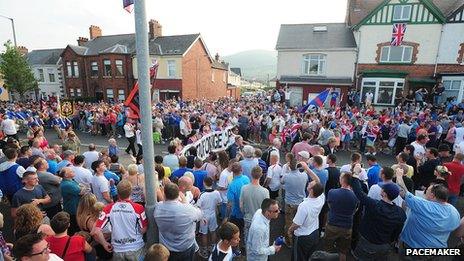
Police were enforcing a Parades Commission ban
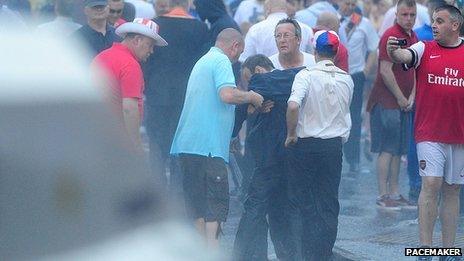
Nigel Dodds was hit by a missile after earlier appealing for calm in north Belfast
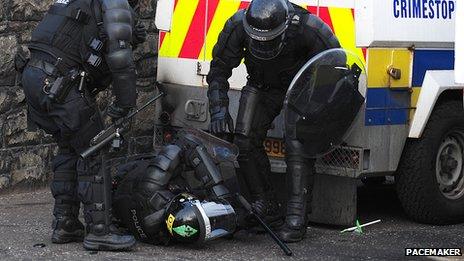
Police officers help an injured colleague in north Belfast
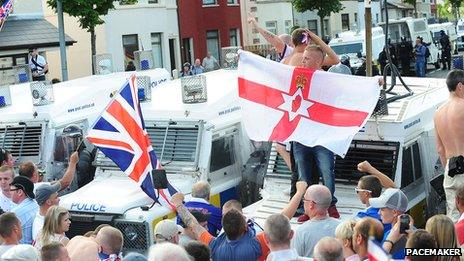
The Parades Commission ruling stops Orange Order lodges from walking on a stretch of road in north Belfast that separates loyalist and nationalist communities
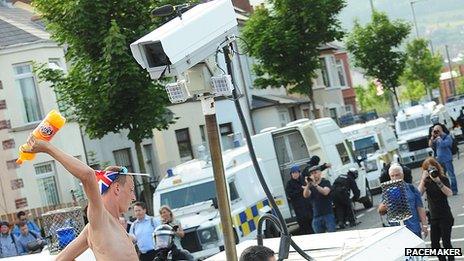
Bricks and bottles were thrown during the trouble
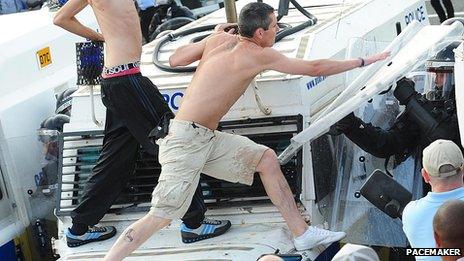
Water cannon and baton rounds were used on the Woodvale Road
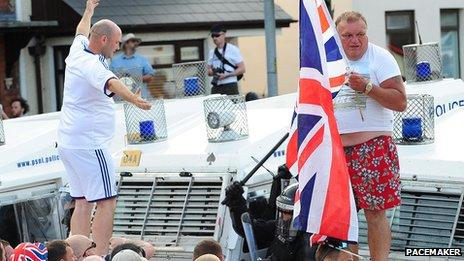
Police officers appealed for politicians to use any influence they could to calm the situation
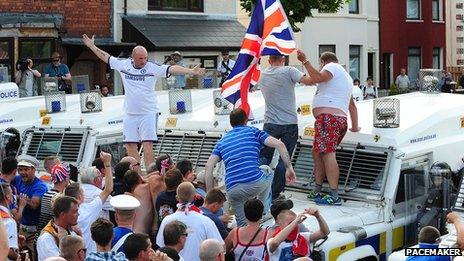
The lodges were allowed to walk on the stretch of road in the morning but were banned from doing so on their return in the evening
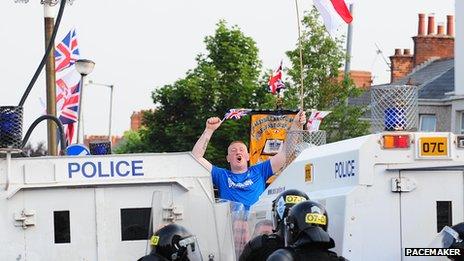
The Parades Commission said the lodges could go no further than the junction of Woodvale Road and Woodvale Parade
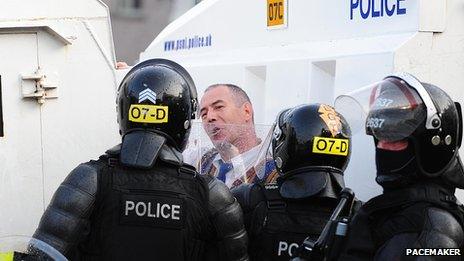
Police prevented them from walking between that point and the junction of the Crumlin Road and Hesketh Road
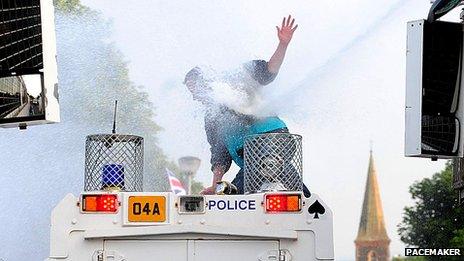
In recent years, there has been serious rioting in the nationalist Ardoyne area following the return leg of the parade
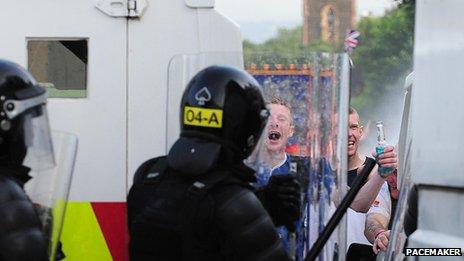
The Parades Commission ruling caused anger in loyalist communities
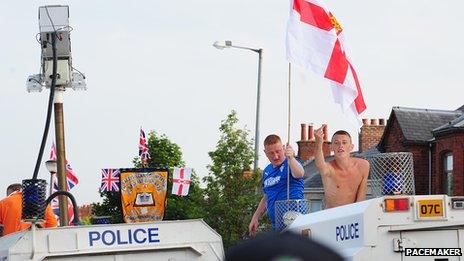
Young men express their anger at the Parades Commission ruling
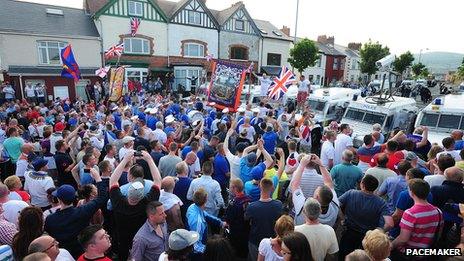
Every year on 12 July Orangemen march to commemorate William of Orange's victory over the Catholic King James II at the Battle of the Boyne in Ireland in 1690
Trouble also broke out on the Newtownards Road in east Belfast with petrol bombs being thrown at police lines.
Northern Ireland First Minister and DUP leader Peter Robinson appealed for "cool heads" and said his thoughts were with those "who have been injured this evening, including my colleague Nigel Dodds".
The Grand Orange Lodge of Ireland has also called for calm.
Sinn Fein assembly member Gerry Kelly has blamed the Orange Order and unionist politicians for the violence.
He accused them of having a deliberate strategy that had produced "inevitable results".
The marching season in Northern Ireland is a period of events from April to August, with the highpoint on 12 July when Orangemen march to commemorate William of Orange's victory over the Catholic King James II at the Battle of the Boyne in Ireland in 1690.
William III is revered by the order as a champion of his faith. The Orange Order commemorate his victory in their annual parades.
Many Catholics see the marches as triumphalist and sectarian with some traditional Orange routes passing through or past areas occupied mainly by Catholics and nationalists.
The Parades Commission ruling on the north Belfast parade was welcomed by nationalist politicians but angered unionists.
- Published13 July 2013
- Published13 July 2013
- Published13 July 2013
- Published13 July 2013
- Published12 July 2013
- Published11 July 2013
- Published9 July 2013